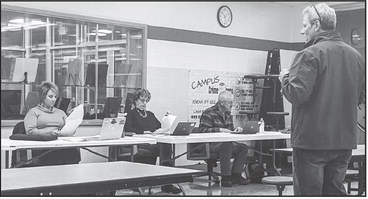Marathon referendum approved
By Kevin O’Brien
Voters in the Marathon School District on Tuesday granted a request by the school board to increase the district’s revenue limit by $1.6 million on a recurring basis, approving a referendum 1,549 to 1,356.
The referendum won 53 percent support from the 2,905 voters who cast ballots in the election, allowing the district to set a tax levy of just under $4.9 million for 2024-2025, which includes $4.5 million for general operations, $36,731 in nonreferendum debt payments and $332,900 in referendum-approved debt.
This tax levy was one of two options chosen by the school board at a special meeting on Oct. 21. If the referendum had failed, the district was prepared to set a tax levy of $3.7 million, which would have included $2.9 million for operational expenses, $36,731 for non-referendum debt payments, and $797,077 for previous referendum debt with a defeasance, which allows districts to prepay their debts and save on interest costs.
Approval of the referendum was not universal across the district. While the vote total was 557-345 in favor of the ref-
See REFERENDUM/ page 8 Referendum
Continued from page 1
erendum in the village of Marathon City, it earned more no votes than yes votes in the towns of Berlin (34-40), Marathon (332346), Mosinee (20-28), Rib Falls (204-220), and Stettin (135-160).
However, a majority of residents in three rural townships voted yes on the question, including Cassel (196-170), Emmet (67-47), and Hamburg (4-0).
The school board voted in August to put the referendum question on Tuesday’s ballot, asking voters to approve a $1.6 million increase in the district’s revenue limit on a recurring basis. The additional money will be used to cover a variety of operational expenses, including staff for a growing student population and replacing three sections of roof on the district’s two buildings.
At a public hearing in September, Parks said passing the referendum would add approximately 13 cents over the district’s 2023--2024 mil rate, bringing it to $7.92 per thousand dollars of property due to the increased valuation in the district. If the referendum did not pass, the mil rate would have been either $5.22 or $6.37 if the board put more money into defeasance to pay down debt.
Parks also said the district’s mil rate would have dropped significantly if the referendum did not pass – about $200 less per thousand dollars of property value – but it would also leave the district with a $1 million deficit by the end of the school year. This would have cut into the fund balance, which would drop into the negative by 2027, and lead to tax bills spiking in future years.
The September hearing was one of three hosted by the district to address voters’ questions and concerns. On Monday, Parks said just two residents showed up to a final hearing held Oct. 30, and they mostly sought clarification on the impact of the referendum.



